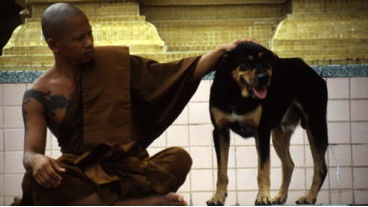
CASE #43: Jōshū’s “Mu”
A monk asked Jōshū, “Has a dog the Buddha Nature?”
Jōshū answered, “Mu.”
BACKGROUND:
Jōshū (Ch. Zhàozhōu) lived from 778 to 897 C.E. and is often said to be the greatest Ch’an master of the Tang Dynasty. Over 10% of the cases in the classic koan collections Blue Cliff Record and Gateless Gate concern him, the most famous being the current case. Jōshū studied with Nansen as a young monk and later traveled throughout China, visiting famous Ch’an masters in order to polish his understanding. At age 80 he settled down at Kuan-yin Temple in northern China, where he taught a small group of monks until his death 40 years later.
Buddha Nature A term used in Mahayana Buddhism to refer to the inherently enlightened nature of all sentient beings, Buddhahood being something that, strictly speaking, is realized rather than attained.
Mu (Chin., Wu) The character literally means “No,” or “Nothingness.” As a response to the monk’s question, the word is more of an invitation than an answer.
NOTE: This case appears at the beginning of the Mumonkan, or “Gateless Gate,” a book of Ch’an koans collected by Mumon in 13th century China.
COMMENTARY:
Mumon’s commentary is already green (his comments in bold):
In order to master Zen, you must pass the barrier of the patriarchs.
This barrier doesn’t belong to the patriarchs, nor is it created or maintained by them. Mumon should have called it the barrier “to” the patriarchs rather than the barrier “of” them.
To attain this subtle realization, you must completely cut off the way of thinking.
The “mind road” invented by Homo sapiens sapiens offers many detours on the evolutionary journey through deep time.
If you do not pass the barrier, and do not cut off the way of thinking, then you will be like a ghost clinging to the bushes and weeds.
“Biology, not ideology” is the basic teaching of Ch’an.
Now, I want to ask you, what is the barrier of the patriarchs?
This is like turning to the dictionary for a definition of the word dictionary.
Why, it is this single word “Mu.” That is the front gate to Zen.
Mu is a front gate that has no back. The barrier is real to the monk, but not to Jōshū.
Therefore it is called the “Mumonkan of Zen.”
“The Gateless Gate”—because it has a front, but not a back.
If you pass through it, you will not only see Jōshū face to face, but you will also go hand in hand with the successive patriarchs, entangling your eyebrows with theirs, seeing with the same eyes, hearing with the same ears.
These are patriarchs in an evolutionary lineage, not an ideological one. Ch’an Buddhism’s “mind to mind transmission, not relying upon written scriptures” is the reawakening of a knowledge contained not in books, but within our cells. “To see with the same eyes and hear with the same ears” is to reclaim the birthright of a species.
Isn’t that a delightful prospect? Wouldn’t you like to pass this barrier?
Mumon sounds like a father coaxing a child to jump off the diving board for the first time. “Doesn’t the water look nice? Wouldn’t you like to dive in?”
Arouse your entire body with its three hundred and sixty bones and joints and its eighty-four thousand pores of the skin; summon up a spirit of great doubt and concentrate on this word “Mu.”
Jōshū’s voice is like the sound of real rain entering into dream.
Carry it continuously day and night. Do not form a nihilistic conception of vacancy, or a relative conception of “has” or “has not.”
The mind cannot accomplish this, but the body can. Eventually, mind gets exhausted, and lets body do the work.
It will be just as if you swallow a red-hot iron ball, which you cannot spit out even if you try.
Why is this small word Mu such a very big pill to swallow? For the same reason that Mumon’s gate has a front but no back.
All the illusory ideas and delusive thoughts accumulated up to the present will be exterminated, and when the time comes, internal and external will be spontaneously united. You will know this, but for yourself only, like a dumb man who has had a dream.
The eyeball cannot look at the eyeball, even though it sees. Again, “biology, not ideology” is the basic teaching of Ch’an.
Then all of a sudden an explosive conversion will occur, and you will astonish the heavens and shake the earth.
It’s not possible to explain to the monk how a gate can have a front but no back. Better to lead him on with extravagant promises than try to make it clear. Just let him see for himself.
It will be as if you snatch away the great sword of the valiant general Kan’u and hold it in your hand. When you meet the Buddha, you kill him; when you meet the patriarchs, you kill them. On the brink of life and death, you command perfect freedom; among the sixfold worlds and four modes of existence, you enjoy a merry and playful samadhi.
The general’s sword is only a willow branch just now coming into bud. The remarkable thing about it is, it doesn’t have to be sharp, only green.
Now, I want to ask you again, “How will you carry it out?” Employ every ounce of your energy to work on this “Mu.” If you hold on without interruption, behold: a single spark, and the holy candle is lit!
The spark doesn’t come from Jōshū, or from Mumon. How could it? This gate has a front but no back.
VERSE:
The monk asked Jōshū,
“How is a dog like Buddha?”
Jōshū responded
By pushing him off a cliff!
How else could he have answered?
Thank you for subscribing to Tricycle! As a nonprofit, we depend on readers like you to keep Buddhist teachings and practices widely available.